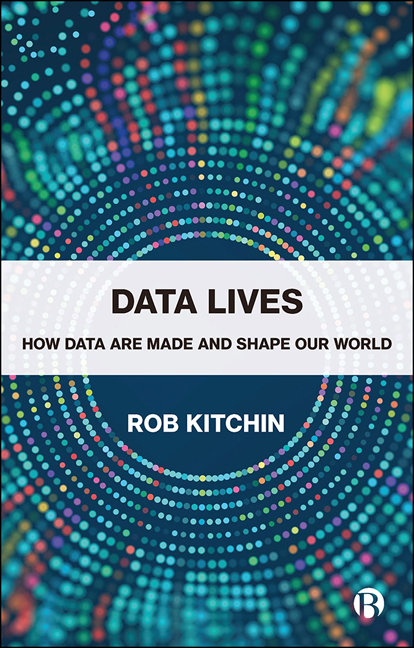3 - The Nature of Data
Published online by Cambridge University Press: 05 January 2022
Summary
The divergent positions of Emma and Julian in the previous chapter are illustrative of the different ways in which data are conceptualized within the academy. For Emma, data are straightforwardly raw pieces of information about the world, which she collects through her sound sensors. Sounds pre-exist their capture, and her measurements are directly representative of audible electromagnetic frequencies present in the atmosphere. In this sense, data seem unproblematic and commonsensical. They are benign, objective and non-ideological in character, reflecting the world as it is subject to technical constraints; they are raw measures that exist independent of philosophical thought. It is the job of the scientist – or government bureaucrat or business process controller – to collect and record data using suitable instruments and processes, and to use them to make sense of, and act in, the world. There is no politics or other agenda at play and the data collected can be taken at face value. The sensor simply measures sound, where the phenomenon measured is independent of the measuring process. By following established procedures and acting rigorously, high-quality data are captured.
Emma does not deny that there can be issues with integrity in data collection, but believes it is the job of the scientist to find the best, most representative way of capturing data, and to develop and apply techniques to effectively nullify any noise, errors or gaps in the dataset. In this way, the validity (represents what it is supposed to), veracity (accuracy and precision), and reliability (consistency over time) of the data, and any analysis undertaken using then, can be assured. In other words, for Emma, it is only the uses of data that are political, not the data themselves or the science used to collect and analyze them. This is reflected in the technical terms used by scientists to describe their data processes: ‘collected’, ‘entered’, ‘compiled’, ‘stored’, ‘processed’ and ‘mined’.
Julian has a fundamentally different view. He understands data as being produced not collected. Data do not pre-exist their generation, but are created through the process of conducting science. Decisions by scientists concerning the general methodological approach, specific techniques, instruments and their calibration, sampling frames and so on, make a difference to what data are manufactured.
- Type
- Chapter
- Information
- Data LivesHow Data Are Made and Shape our World, pp. 23 - 30Publisher: Bristol University PressPrint publication year: 2021



